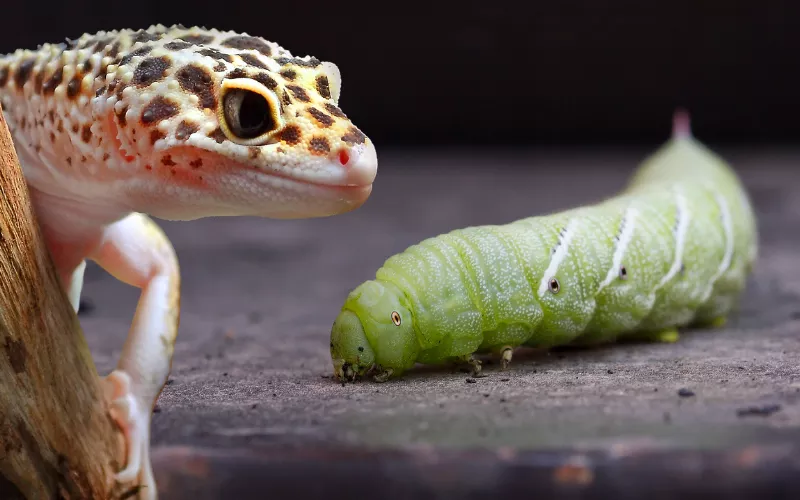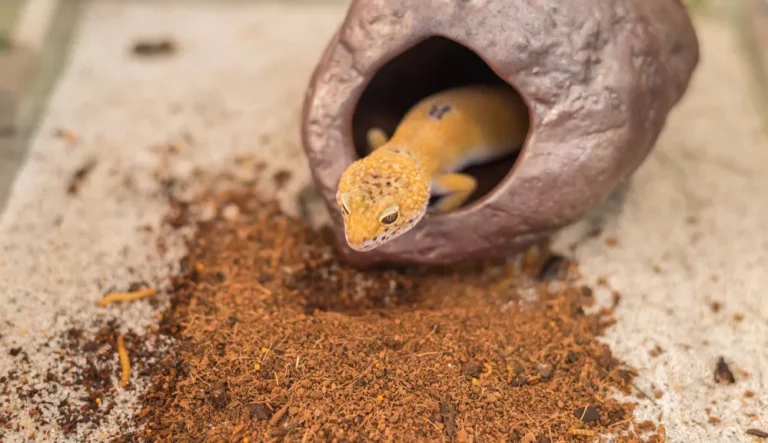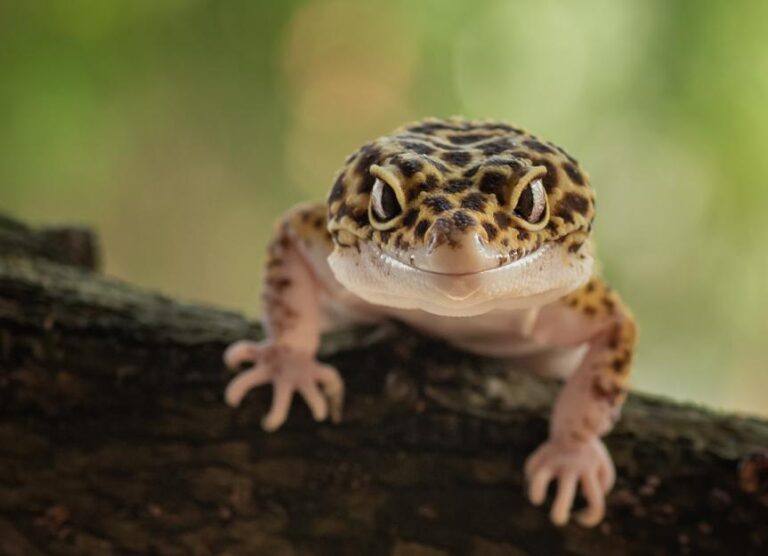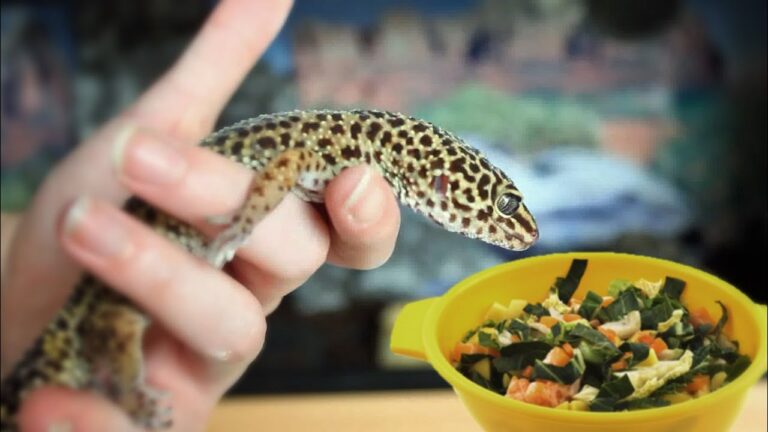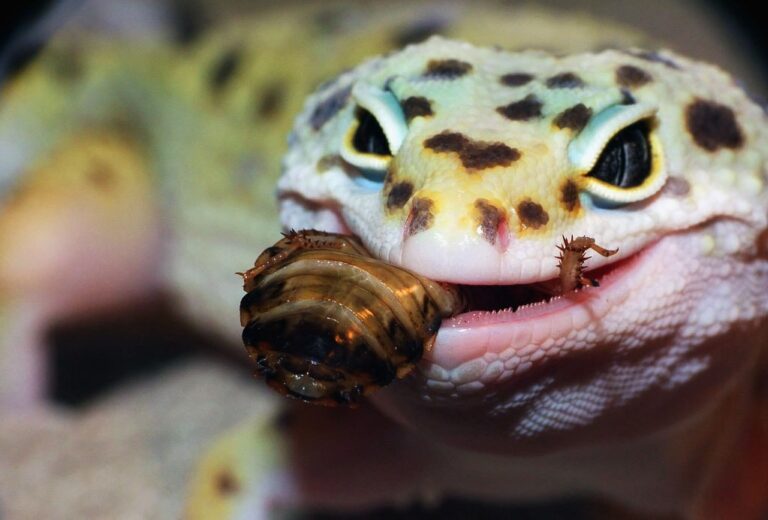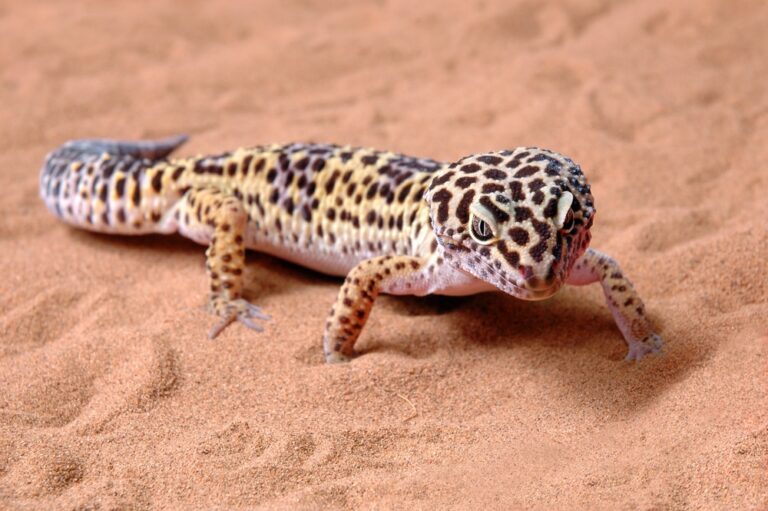Can Leopard Geckos Eat Hornworms: Unlocking The Secret
As I gazed into the terrarium of my beloved leopard gecko, Gizmo, I couldn’t help but marvel at his tiny, captivating world. The miniature landscapes, cozy hides, and that curious expression he wore made me realize how essential it was to provide him with the best possible care. One question that had been on my mind lately was, “Can leopard geckos eat hornworms?”
It was a query born from the desire to diversify Gizmo’s diet while ensuring he remained healthy and vibrant. After a lot of research, I offered my pet those bugs, Guess what found?
My Leo found it very tasty.
So, Yes you can offer them hornworms, they serve as a delectable feast for them and their calcium-rich composition elevates them to the zenith of nutritional indulgence.
let’s embark on this enlightening adventure and discover whether hornworms are the next culinary delight for your scaly friend.
What are the benefits and downsides of including hornworms in your leopard gecko’s diet?
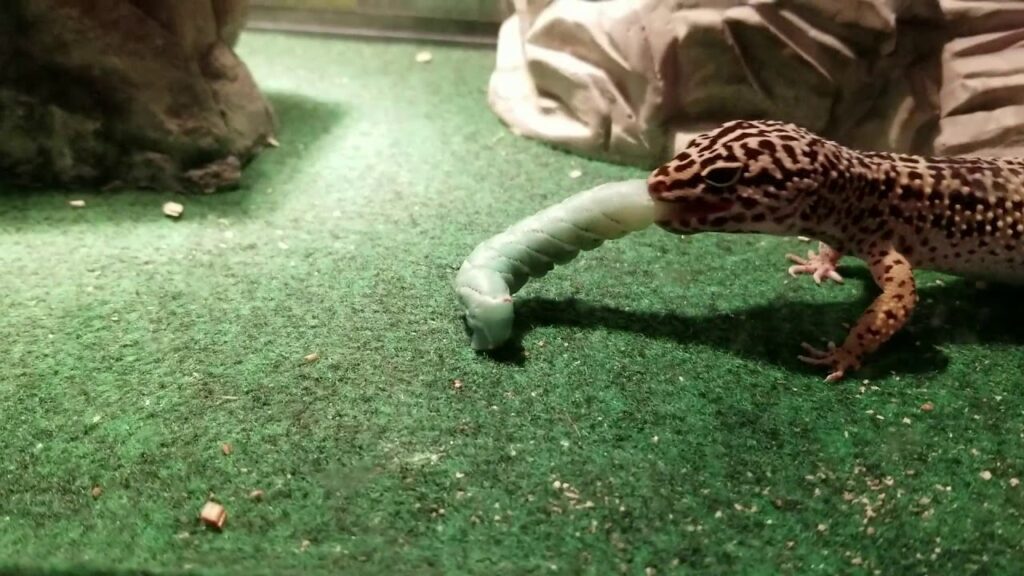
When considering worms as part of your leopard gecko’s diet, it’s essential to recognize that no single type of worm can fulfill all its nutritional requirements. Therefore, it’s advisable to maintain dietary variety for your pet.
Let’s delve into the nutritional profile of hornworms to better grasp their contribution to your pet nutrition:
Nutritional Breakdown:
- Moisture: 85%
- Protein: 9%
- Calcium: 4%
- Fat: 3%
Like many other worms, hornworms possess a high moisture content, ensuring your gecko stays well-hydrated. They are also a notable source of calcium. However, their protein content is comparatively low, potentially leading to a protein deficiency if exclusively relied upon.
Here’s a comprehensive overview of the advantages and disadvantages of incorporating hornworms into your pet Leo’s diet:
Advantage:
- They strike a bluish-green hue that visually appeals from a distance.
- Dig Due to their minimal chitin content. So, is easily digestible for your pet.
- Hornworms grow swiftly, and their size variation allows you to feed smaller ones to juvenile geckos.
- With a low-fat content, even slight overfeeding won’t lead to excess weight gain.
- These bugs carry a significant amount of water, aiding in your pet’s hydration needs.
- They are not particularly fast-moving, making them easy prey for your leopard gecko.
- Also, convenient because they come in a cup with their food, so you don’t need to worry about storing or maintaining them separately, apart from occasional cleaning.
Disadvantage:
- Tend to be relatively expensive in comparison to other feeder insects.
- Their protein content pales in comparison to alternatives like crickets, mealworms, and superworms.
- They have a limited shelf life and can’t be stored for more than two months.
- Leopard geckos can become addicted to hornworms, potentially refusing other worm varieties.
- They primarily consume sweet foods, limiting their suitability for gut-loading.
Can Leopard Geckos Eat Hornworm Pupa?
Here’s the life cycle of a hornworm:
- Eggs
- Larvae
- Pupae
- Moths
Feeding leopard geckos with hornworms in the pupa stage is generally safe until they grow too large and become hard. Your lizard can consume pupae up to 2.5 inches (63.5 mm) in length, but there’s a risk of suffocation.
Furthermore, exercise extra caution if you have a hatchling. It’s best and safest to avoid offering pupae to juvenile leopard geckos.
Can Baby Leopard Geckos Eat Hornworms?
Yes, Baby leopard geckos have different needs than adults. They need smaller meals, more often, and lots of calcium.
Feeding Schedule:
- Babies: 3 meals a day with small, easy-to-digest insects and worms.
- 6 months to 1 year: 1-2 meals a day.
Hornworms for Hatchlings:
- Hatchlings can eat hornworms, but not too many.
- Offer 1-2 tiny caterpillars per week.
Precautions:
- Choose small caterpillars to prevent choking.
- Don’t offer bigger meals than your baby gecko can eat in 10 minutes.
- Match prey size to the space between their eyes.
Avoid Buying Too Many Worms:
- Worms, especially hornworms, grow quickly.
- Buy smaller amounts until your gecko is one year old.
How Often Can Leopard Geckos Eat Hornworms?
Hornworms are like gecko candy, but too much of a good thing isn’t healthy. Offering them too often can lead to gecko addiction. To avoid this, give them as a treat once a week, or some suggest every two weeks.
Keep in mind that they can be expensive, so watch your budget. Ultimately, The goal is to balance treats with a healthy diet. If addiction becomes an issue, take a break until your gecko eats other foods again.
Ways to Feed Hornworms to Your Leopard Gecko
Hornworms are a practical choice for feeding your leopard gecko because they move slowly, making it easy for your lizard to catch them. They are also moist, aiding in swallowing.
However, these caterpillars may lack some essential nutrients, like proteins, so here’s how to enhance their nutritional value:
1. Gut Loading:
- Hornworms might not have all the nutrients your gecko needs, so “gut loading” them is essential.
- Gut loading means feeding the hornworms nutritious foods to indirectly pass those nutrients to your gecko.
- Ideally, do this 12 to 48 hours before offering hornworms as a meal.
- Keep in mind that hornworms are attracted to sweet foods, so gut loading might not be a long-term solution.
2. Supplementation:
- Your pet requires essential supplements for its health.
- Provide calcium, but if your lizard lacks UVB radiation, also give vitamin D3 supplements.
- Ensure the D3 supplement contains no more than 50,000 IU/kg.
- Maintain a calcium-to-phosphorus ratio of 2:1, but not exceeding 2.5:1 to prevent calcium absorption issues.
Follow a supplementation schedule based on your gecko’s age:
- Baby geckos: Multivitamin once a week, calcium three times a week.
- Juveniles: Weekly calcium and multivitamins.
- Adults: Calcium once a week and multivitamins monthly.
3. Dusting:
- Leopard geckos may lack certain vitamins and minerals due to their diet, so you can “dust” hornworms with supplement powder.
- Use a supplement powder containing multivitamins.
- Place hornworms for one meal and a pinch of powder into a Ziploc bag, shake gently, and serve.
- Generally, you don’t need to dust hornworms with calcium since they are naturally calcium-rich.
How Can Hornworms Harm Your Pet Leopard Gecko?
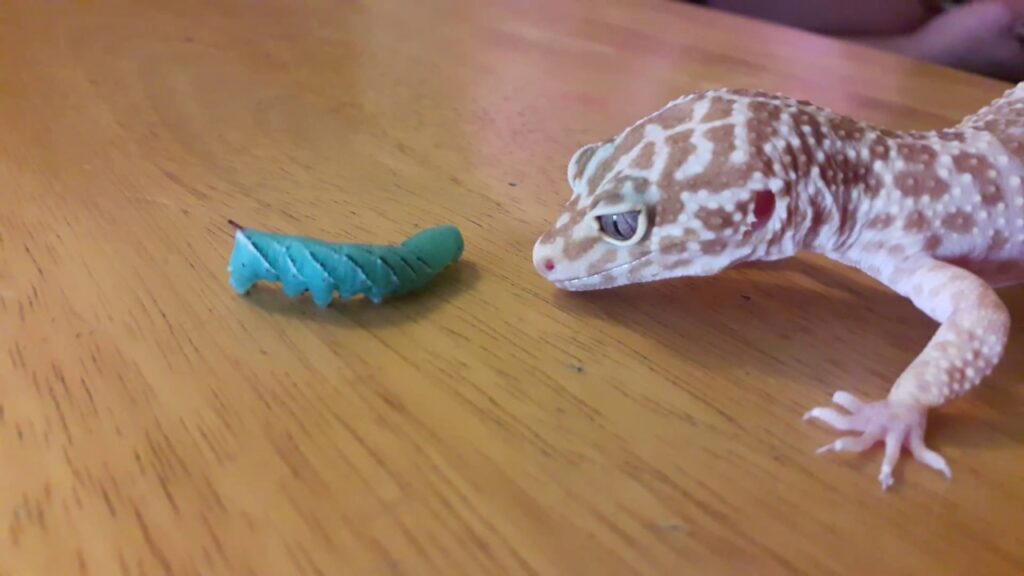
Toxicity Concerns: Hornworms themselves are not toxic to your leopard geckos. However, they can potentially carry parasites or harmful bacteria that could make your pets sick over time. Detecting toxicity in worms isn’t easy unless you’re an expert.
For instance, if you collect wild ones from your backyard or garden, they might have fed on plants containing toxins, or they could have been exposed to pesticides or fertilizers. If your gecko eats these worms, they could become ill.so, Buy them from online, or reputed stores.
Size and Choking Hazard: When hornworms are too large for your pet, they can become a choking hazard. To avoid this, it’s important to match the size of the hornworm with your lizard’s ability to swallow safely. This is especially crucial for young or smaller reptiles.
Addiction and Dietary Imbalance: They are highly appealing due to their taste and texture. Feeding them too frequently can create a preference, causing your pet to reject other foods. This can lead to an unbalanced diet and nutritional deficiencies over time.
Cost Considerations: Also, can be more expensive compared to other feeder insects. Overindulging in hornworms may strain your budget, particularly if you have multiple reptiles to feed.
Pupa Stage Challenges: Moreover, go through various life stages, including the pupa stage. Feeding your pet with pupae that are too large and hard can result in digestion difficulties and the risk of suffocation, especially for smaller or younger re
How Many Hornworms to Feed My Leopard Gecko?
| Leopard Gecko Age | Number of Hornworms per Feeding |
| Baby (Hatchling) | Up to 1 Small Hornworm a Week |
| Juvenile | 1 Medium-Sized Hornworm, or 1-3 Small Hornworms, Twice a Week |
| Adult | 1 Large Hornworm, 2-3 Medium-Sized Hornworms, or 3-4 Small Hornworms Once a Week |
FAQs
Are Hornworms Too Big for Leopard Geckos?
Yes, Hornworm size matters. They can be a choking hazard if too large, especially for baby and juvenile geckos.
Do Leopard Geckos Eat Hornworms in the Wild?
No, In the wild, leopard geckos primarily consume insects, and hornworms are not a typical part of their natural diet.
Can Hornworm Bites Hurt Leopard Geckos?
No, Hornworms are not known to harm geckos with their bites. Geckos usually consume them without issues.
Can Leopard Geckos Choke on Hornworms?
Yes, leopard geckos can potentially choke on large hornworms, especially if the worms are too big for them to swallow safely.
Are Hornworms Toxic to Leopard Geckos?
No, Hornworms themselves are not toxic to leopard geckos. However, they may carry parasites or bacteria that can be harmful if ingested.
How Many Hornworms to Feed My Leopard Gecko?
The number of hornworms to feed your gecko depends on their age. Generally, adult geckos can have one large hornworm per week, while hatchlings should have no more than one small hornworm weekly. Juvenile geckos fall in between, with specific quantities based on their size and age. Adjust as needed for your individual gecko’s appetite.
Final word:
In conclusion, I’ve learned that leopard geckos can safely enjoy hornworms as part of their diet. These worms provide hydration and essential nutrients, but it’s crucial to be mindful of the gecko’s age and size when feeding them.
Additionally, overfeeding can lead to health problems, so moderation is key. It’s also important to source hornworms from reputable suppliers to minimize potential risks from parasites or toxins. By offering a balanced and varied diet, I can introduce theem as an occasional treat to enhance my leopard gecko’s overall health and happiness.

